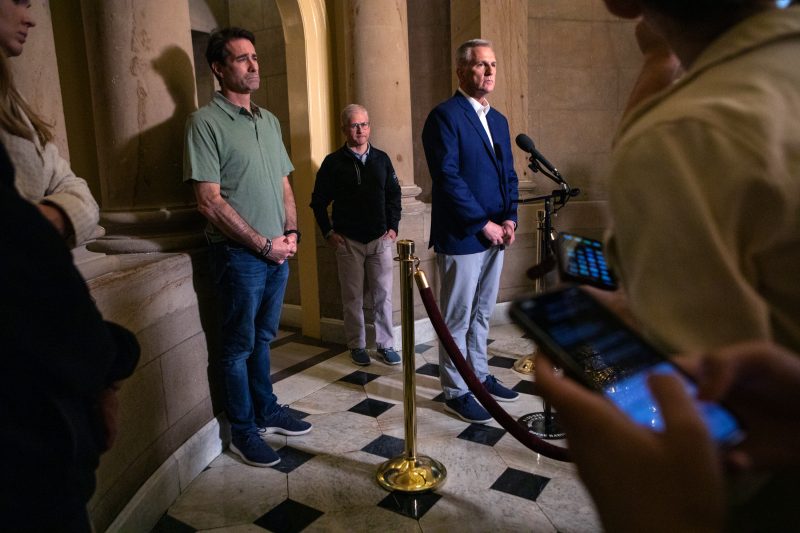The day after announcing a bipartisan compromise to raise the debt ceiling, White House aides and House Republican leaders turned to selling the agreement on Sunday, with just days to pass the measure through both chambers of a factionalized and deeply divided Congress.
In conference calls with lawmakers throughout the day, surrogates for both President Biden and House Speaker Kevin McCarthy (R-Calif.) argued that the deal represented major victories for their respective parties that needed to be swiftly signed into law. Biden and McCarthy also publicly defended the agreement, while acknowledging that both sides make sacrifices to get a deal done.
The deal’s brokers encounter significant skepticism from liberals concerned that it imposes punitive work requirements on the poor and claws back new money for the Internal Revenue Service. Conservatives also said it does not do enough to restrain government spending. Compounding the unease on both sides is that negotiators did not release the text of the 99-page bill until after 7 p.m. Eastern on Sunday. That potentially gives lawmakers only a brief window to read the measure before it must be passed to avoid a global economic crisis.
“No one got everything they want. But that’s the responsibility of governing,” Biden said at the White House after speaking to McCarthy on Sunday, urging lawmakers to approve the agreement. “It takes the threat of catastrophic default off the table.”
Asked if he made too many concessions to get an agreement from Republicans, Biden responded simply: “I didn’t.”
Biden also did not endorse abolishing the debt limit, as many Democratic lawmakers — and Treasury Secretary Janet L. Yellen — have. Still, he said the administration might explore at a future date the potential for the 14th Amendment of the Constitution to be invoked, which many lawmakers think makes any debt ceiling unconstitutional.
“I think it will cause more controversy getting rid of the debt limit, although I am exploring the idea that we would at a later date — a year or two from now — decide whether the 14th Amendment” could invalidate the debt limit, Biden said.
Meanwhile, McCarthy has been privately reassuring his conference while publicly reinforcing how the emerging deal is a compromise that everyone should support.
“We’re finalizing an agreement with the president that I believe is worthy of the American people,” he told reporters Sunday morning. “It doesn’t get everything everybody wanted. But that’s, in divided government, that’s where we end up. I think it’s a very positive bill.”
McCarthy confidently projected Sunday that he would get the “majority of the majority” of House Republicans to vote for the deal, a standard to bring any legislation to the floor that staunch conservatives pushed McCarthy to accept in exchange for their votes so he could become speaker. That suggests GOP leaders would need at least 111 Republicans to support it, plus up to 107 Democrats to reach the 218-vote threshold needed to pass the House.
During a call with House Democrats on Sunday afternoon, Office of Management and Budget Director Shalanda Young defended the agreement for largely freezing spending on domestic programs and staving off the steep cuts Republicans had sought, according to two people familiar with the matter, who spoke on the condition of anonymity to describe the private conversation. Still, some Democrats were alarmed that the agreement takes about $20 billion from an $80 billion expansion for the IRS approved by the party last year aimed at improving tax enforcement and taxpayer services.
Liberal angst about the domestic spending freeze was exacerbated by the bill’s increase to the military budget, which many Democrats oppose.
Conservative frustration has centered on the bill’s relative lack of spending cuts. GOP leaders have emphasized that spending on domestic programs will drop, but White House officials say the deal makes those initiatives whole by redirecting money from the IRS and from unused coronavirus aid.
Budget experts say the deal may lead to deficits that are a few hundred billion dollars lower than prior projections, but it will not meaningfully change the trajectory of the federal debt, which is set to balloon to $52 trillion at the end of the decade.
House Minority Leader Hakeem Jeffries (D-N.Y.) said Sunday morning that he was reserving judgment on the deal, noting that his caucus had yet to review the legislative text when pressed on whether he could deliver the necessary votes. White House officials are set to brief all House Democrats early Sunday evening but have touched base with individual members and circulated a three-page “topline points” document to all offices. They will brief Senate Democrats following their call with House members.
Jeffries said on CBS’s “Face the Nation” that he trusts Biden to deliver “a result that avoids a catastrophic default, that prevents us from our economy crashing and stops the extreme MAGA Republicans from triggering a job-killing recession.”
Republicans have acknowledged throughout the weeks of negotiations that they will need Democratic votes to advance a bipartisan bill to the Senate, given that their partisan proposal barely had enough support to pass through their four-vote majority last month.
Understanding the debt ceiling
1/4
End of carousel
Members of the staunchly conservative House Freedom Caucus have already balked at the measure, tweeting their objections after House Republicans held an all-member briefing Saturday evening. Many have echoed their informal adviser Russ Vought, former president Donald Trump’s OMB director, who argues the deal will mean $4 trillion in additional debt and who directed conservatives to “fight” against the bill with “all their might.”
“No one claiming to be a conservative could justify a yes vote,” said Rep. Bob Good (R-Va.), who never backed McCarthy for speaker, though has complimented him during his tenure thus far.
Rep. Ralph Norman (R-S.C.), a member of the House Freedom Caucus, said he would not support the bill and hopes the GOP votes it down. “All that does is send it back to negotiations. A no deal is better than a bad deal,” Norman said in an interview. He said the caucus plans to meet on Tuesday when lawmakers return to Washington and are expected to vote on denouncing the bill.
McCarthy said on “Fox News Sunday” that “more than 95 percent of all those in the conference were very excited” about the bill.
Republican leaders and key allies to McCarthy will need to gauge where lawmakers across the five ideological factions stand, to ensure that support does not drop off too far as Freedom Caucus colleagues or outside influencers try to build support against the GOP leadership.
Rep. Dusty Johnson (R-S.D.), who chairs one of those factions — the Main Street Governance Group — praised the deal struck by McCarthy and Biden in part because it contains many Republican priorities.
Speaking on CNN’s “State of the Union,” Johnson characterized the overall GOP resistance as minimal since it has only been expressed by “the most colorful conservatives” in the conference. Johnson boldly predicted that even some of the roughly three dozen Freedom Caucus members could end up voting for the bill. He did acknowledge Good as a holdout who wouldn’t be swayed, even with divine intervention.
“Doesn’t matter if Mother Teresa came back from the dead and called him. He’s not voting for it. He was never going to.” Johnson then added: “This is going to pass.”
The first real test will come when the House Rules Committee convenes this week to debate and vote on whether to pass the deal for full consideration on the House floor. Leaders hope the full vote could happen as soon as Wednesday.
The rules committee is made up of nine Republicans and four Democrats. It’s unclear whether any of the Democrats would support the bill, but as a matter of course, committee members from the minority party typically vote no. So the outcome could come down to a single Republican who is so far undecided about the bill.
More broadly, Democrats have been worried for weeks that the White House has not defended the party’s priorities and even Sunday were struggling to understand whether there will be enough support to pass the measure.
Rep. Pramila Jayapal (D-Wash.), who chairs the Congressional Progressive Caucus, said on CNN’s “State of the Union” that the White House should worry about whether it can get all of the roughly 100 members in the caucus on board. She did not know if she would support the deal since she has not seen it in writing but is “not happy with some of the things I’m hearing about.” Specifically, Jayapal criticized new work requirements for some people who receive federal food assistance, calling it “bad policy.”
The New Democrat Coalition, a group of about 100 pragmatic and moderate House Democrats, said in a statement Sunday that its members will work with the White House and Democratic leaders to ensure there is enough support from colleagues to get the bill over to the Senate.
“We want to be clear — our Members are committed to upholding the full faith and credit of the United States,” said Rep. Ann Kuster (D-N.H.), who chairs the group.
Rep. James E. Clyburn (S.C.), who serves as House Democrats’ assistant leader, said on MSNBC that the work requirement changes are “a pretty good compromise,” a strikingly different tone than the one used by a majority of Democrats who are uniformly against any new proposals. Clyburn said he spoke two days ago with Biden, who told him he would compromise on able-bodied workers “but not on compassion,” referring to the expanded eligibility for food stamps for the homeless and veterans.
“That’s the kind of person Joe Biden is,” Clyburn said. “A little bit of process, but more compassion.”
Jayapal criticized Republicans for the lengthy and acrimonious process that led to the deal. “You’ve got to ask yourself: ‘What was all the drama for?’ Because they didn’t get what they said they wanted,” Jayapal said.
When asked what Republicans had to give up to get this deal, however, Johnson was insistent: Nothing.
“That is the amazing part to me,” Johnson said. “There were no wins for Democrats,” he said, and “there is nothing out of the passage of this bill that will be more liberal or more progressive than it is today. It’s a remarkable conservative accomplishment.”
Meanwhile, in the Senate, where at least nine Republican senators will need to join all 51 members of the Democratic caucus to send the bill to Biden’s desk, support also seems uncertain.
“I will not adopt the Biden defense budget and call it a success,” Sen. Lindsey O. Graham (R-S.C.) fumed on “Fox News Sunday.”
Sen. J.D. Vance (R-Ohio) retweeted a comment from Rep. Chip Roy (R-Tex.) that criticized the deal, and added that the more he learns about it, “the more I think it’s bad news.”
The White House will also have to persuade Democrats in the upper chamber. Sen. Chris Murphy (Conn.) said on MSNBC, “We are still learning details of this deal” and “I’ll reserve judgment until I’ve read it.”
The lack of legislative text has left much up to interpretation for both parties, presenting the imminent challenge that leaders and key allies will need to work to overcome.
On “Fox News Sunday,” Rep. Jim Himes (D-Conn.) expressed little confidence that a deal could garner enough votes after pointing to the Freedom Caucus’s publicly “obliterating the deal” and predicting his liberal colleagues will be loudly denouncing the bill on the call with White House officials.
“I hope that I’m wrong in my pessimistic prognostication that this could be a disaster,” he said.
Tony Romm, Paul Kane, Meryl Kornfield, Toluse Olorunnipa and Leigh Ann Caldwell contributed to this report.



























